It’s now been 687 days since an Australian side beat a Kiwi side in Super Rugby. After two contests in 2018, it doesn’t look promising. The rejuvenated Rebels, who started the season well, put up a spirited first half before being blown away 50-19 by the Hurricanes. The Brumbies were a similar story last night.
Brumbies head coach Dan McKellar claimed leading up to the clash against the Highlanders “Australian teams are not respected in New Zealand”.
He is right.
There isn’t the respect the way that the New Zealand teams would look at each other. Australian sides aren’t clinical, aren’t creative, aren’t fit enough and lack basic fundamental skills. Many of the sides run the same systems as the New Zealand sides, for example, the Brumbies and Hurricanes both use a 1-3-3-1, but that’s where the similarities end.
Here is the same situation for both sides that will highlight the differences between the Australian and New Zealand sides.
The ball has been spread to sideline through the backs and both sides are looking to reset their 1-3-3-1 pattern, playing back to the open side.
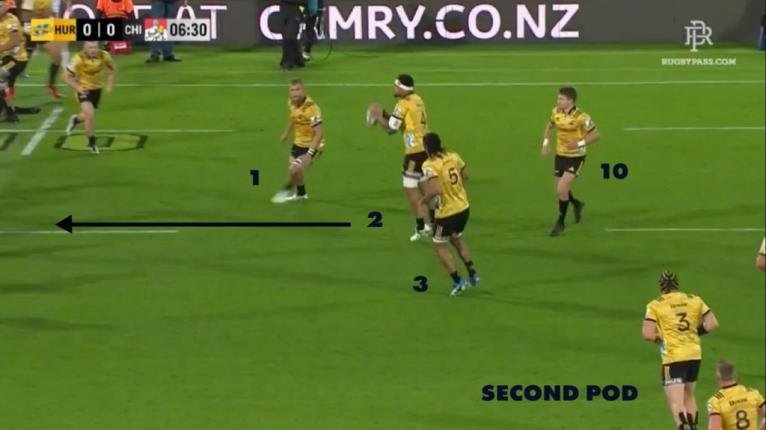
Here we see the first Hurricanes pod of three with Barrett as a backdoor option. Fifita decides to truck it up to set a ruck on the 15 metre tramline.
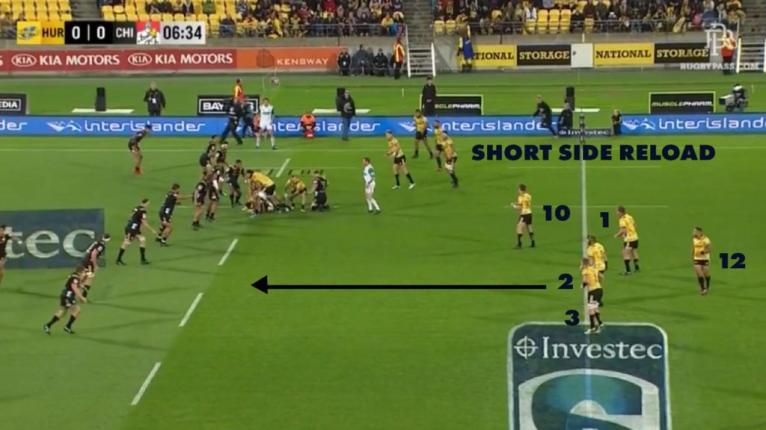
The next phase Barrett moves into first receiver and has the second line of three forwards outside him, with Laumape (12) the back-door option on the swivel pass.

As the play unfolds, we can see a distinct separation between the three forwards on the first level and Laumape as a back-door option on the second level. The Hurricanes forwards are running onto the ball at speed and move together.

Umaga-Allen engages the Chiefs defender into contact and his outside option has also done enough to hold the next man. The Hurricanes are direct and moving forward which holds the space on the outside. Laumape is able to time his run to hit the swivel pass at speed.
Now let’s look at the Brumbies in the same situation. The ball has moved wide left and the Brumbies are setting up to come right.
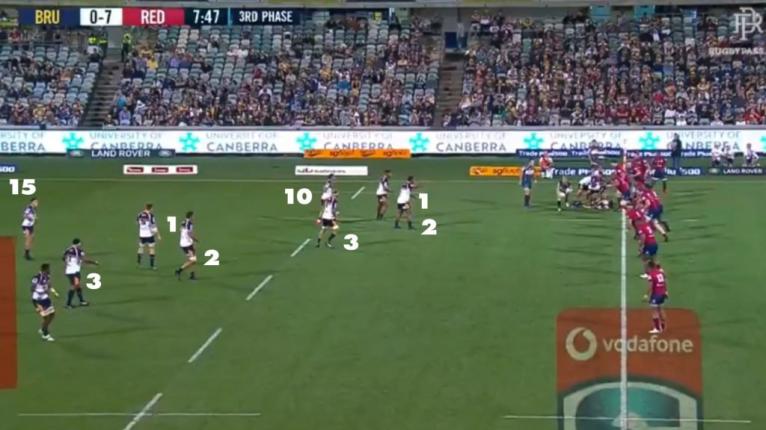
We see less separation between each first level of three forwards and the back-door option. Each pod of three appears jumbled, with uneven triangle formations with players at different depths.
In both pods, the backdoor options, Tom Banks (15) and Harewa Wharenui (10) appear to line up behind the first forward, and in Banks case, actually inside him.
These are all minor details but are important, as we will see. The Brumbies use the swivel pass on the first pod instead of taking a hit up. As Wharenui looks to pass onwards we can see problems already with the next pod.
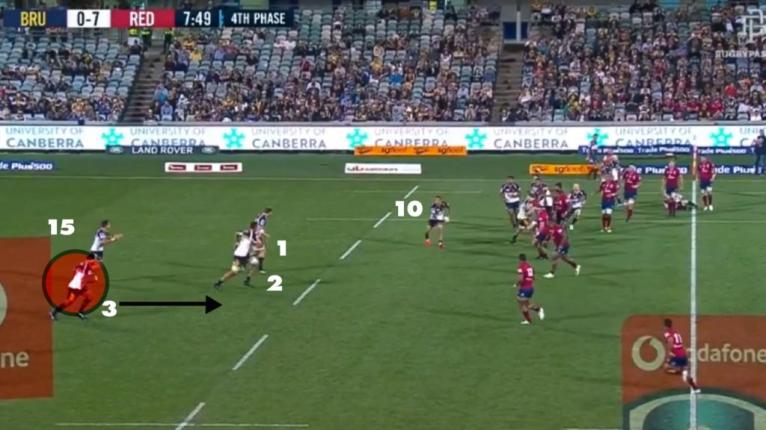
The third forward is not in a position to be a tip option on the first level. He is almost side-by-side with Banks in the second level, which is going to mess the whole movement up. He was too deep to begin with and can’t catch up.
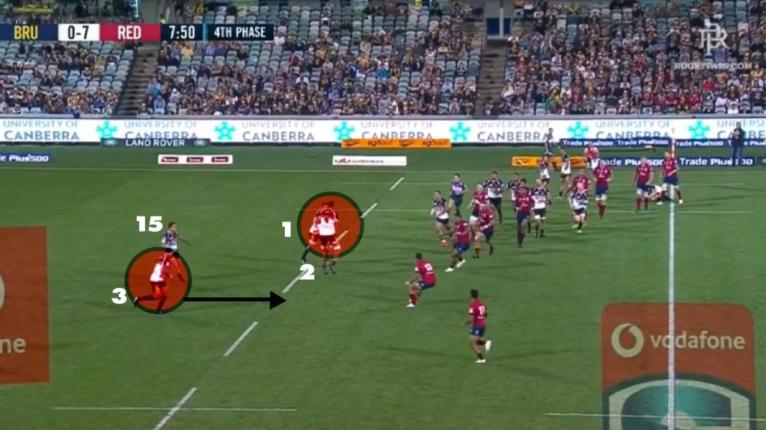
Secondly, the lead runner Arnold unnecessarily jumps in the air to catch a perfectly catchable ball, which throws off the timing of everyone. He lands and becomes stationary, swivels around in the opposite direction around loops a terrible pass to Banks.
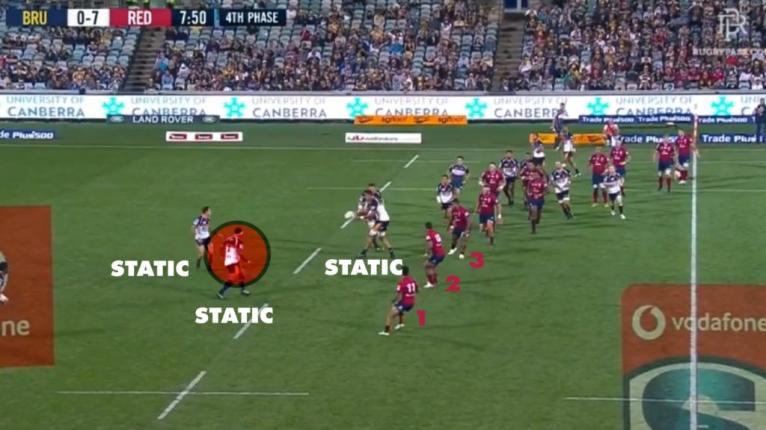
Arnold doesn’t have a second outside option on his right and hasn’t engaged any Reds defenders into contact, allowing all of them to slide. The third runner is also now in the way of Banks and risks being called for obstruction, as Banks hasn’t got past his outside shoulder.
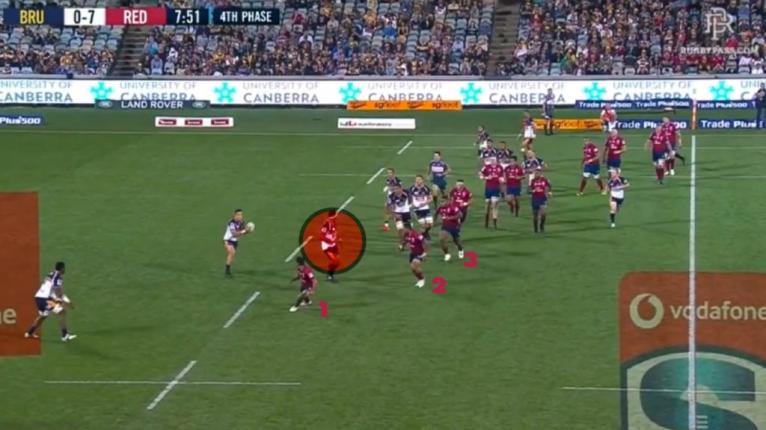
Banks is not able to get outside Reds centre Chris Feauai-Sautia (2), which the play is supposed to create. The third runner is supposed to pull his attention in, while Banks coming around the back at pace is able to get around him. Even still, quick ball could get the ball to the edge to take easy metres but Banks cuts back into the sliding defence.
In contrast, Laumape gets outside his man as the play is designed, draws the next one into contact (Damian McKenzie) and pops a brilliant offload to Lam into the lane that just opened up. Each player in the movement doing their job properly creates the space.

Everyone plays direct, understands their role and has the necessary skills to do so.
The Brumbies, by contrast, are the opposite. The players either don’t know what their jobs are, are too lazy or aren’t good enough to perform them. It’s sloppy from start to finish with a lack of timing and decent passing. It’s this lack of attention to detail that plagues all the Australian sides and why their attack struggles when they play New Zealand sides.
We don’t sit in on the coaches review each week so we have no idea what kind of details get brought up in film review, however, it doesn’t take long to find constant examples of poor execution like this.
The Reds under their previous coaches were deplorable, they have taken big strides under Thorn but have also simplified a lot of what they do keep things basic. Their attack is very one-dimensional and will get blown off the park when they play the New Zealand teams.
The Rebels have improved markedly under Wessels and the ex-Force movement. Their set-piece attack has become the best in Australia, strategically. They deserve credit for the way they use the platform to strike the opposition with elaborate back play, usually with Will Genia involved heavily. Other areas are a concern and yesterday’s loss to the Jaguares proved so.
Australia’s top side is the Waratahs, they now sit atop of the Aussie conference with five wins from seven and are yet to play a Kiwi side. They will get their chance during May when they play four New Zealand sides in a row. They present the best chance to end the streak, perhaps when they play the Blues in Sydney.
If the Waratahs don’t beat the Blues, it will likely be another winless year for Australian sides against the New Zealand conference.




























































